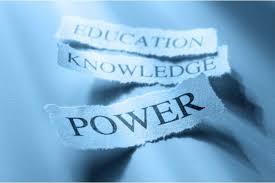The Power of Education

September brings a fresh start to the academic year in America. At a time when our democracy seems threatened by misinformation and a lack of educated dialogue it is more important than ever to create opportunities that ensure a quality education for all citizens.
When deciding whether or not you’re smart, do you take into account your level of education or your life experience/age? In January 2019, an 11-question survey on scientific common knowledge, per se, was conducted. 4,464 randomly selected U.S. adults took the survey and at the end stated their gender, age, and the highest level of education they received. The survey had questions to determine just how much science the average person knew.
The strength of a democracy is based upon the education of its citizens. This is a truth held by founding fathers such as Thomas Jefferson. In Jefferson’s day, the fruits of education were restricted to only the white males with property. How closely is the right to public education today connected to the empowerment and expansion of citizenship? Does education equal power? Who decides on what education in the 21st century matters most?
I know of no safe depository of the ultimate powers of the society but the people themselves, and if we think them not enlightened enough to exercise their control with a wholesome discretion, the remedy is not to take it from them but to inform them of their discretion. –Thomas Jefferson (1820)
Education, in some sense, gives people power in our society. It is more important than some people would like to think. Some think that education is something that can,” contribute to nation-building,”(Nelson Mandela) and that the education of the citizens is something that,” can represent [a nation] well in [the] future as future leaders,”(Nelson Mandela). Is education a cornerstone of a nation/society?
While standardization is important on some level, it can also be imposing at times. How can we be more innovative and skills-based in our public education system? Do some democratic societies do things differently than how we currently are? Is theirs better than our current system? What are some examples of what is working and not working? What are some examples of how things could be different in the public education system in America?

EO • Sep 13, 2019 at 8:55 am
There’s no differences in education. we live in this society today in which we have opportunities to become someone better in life, but the problem is not with the leaders that we have. The problem is with the kids, because some of them make a bad decision. Is not like in the past, because in the past there’s no equality for example: Slavery, like Black kids are not allow to go to school with white kids.
CrazyTibs • Sep 13, 2019 at 8:23 am
What’s great about this current event is the organization, and structure. The images and provided links make understanding the topic further if the reader wishes. Furthermore quotes were featured relating back to the topic. However what would make this current event even better is if there was more elaboration on the questions provided by author. Altogether though a very thoughtful and intelligent writing.